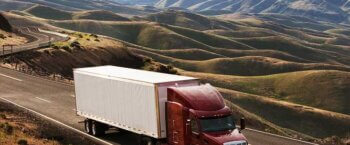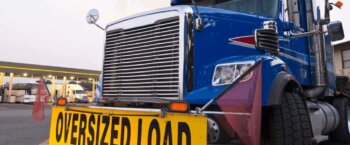Truck Driver Lingo: Truck Industry Terms and Slang Sayings

Join Our
Trusted Network
Help protect your business with the load board you can rely on.
If you’re new to the trucking industry, it’s easy to get lost in a sea of trucker lingo. We’ve probably all heard the most common truck driver slang, thanks to classic movies like Smokey and the Bandit, Convoy, Thelma and Louise, and Black Dog, to name a few. In these movies, trucker slang is communicated between drivers over a CB radio, old-school style. While some CB trucker lingo phrases have made their way into everyday vernacular, most trucker slang probably won’t make much sense if you’re new to the business.
Then there’s all the official trucking terminology you must know, as these terms are prevalent in the everyday life of owner-operators and carriers of all sizes and types. These terms and phrases occur in common business communication between drivers, brokers, and shippers. Much of this terminology refers to a variety of legal or regulatory issues within the freight industry. Familiarize yourself with these terms at the outset of your trucking career, and as you get more experience under your belt, these words will become second nature.
Whether it’s slang or official business terminology, trucker language will make sense as you become more familiar with the job. In the meantime, here’s a cheat sheet to some of the most common truck driver lingo, trucker sayings, and business terms.
Trucking terminology you need to know
Many trucker terms are official, referring to a variety of legal or regulatory matters within the trucking industry. Others are simply slang, often used when two truckers talk to each other. Here are some trucking industry terms you should know.
A
ABS. Anti-lock brake system. This keeps your wheels from locking up, allowing you to stop more quickly and operate more safely on wet, icy, or snowy roads.
AFV. Alternative fuel vehicle. These run on any fuel that isn’t diesel or gasoline.
Authority. Authority, or motor carrier authority, is a regulatory term that refers to legal authorization to transport goods or passengers as part of interstate commerce.
Authorized carrier. An authorized carrier is preapproved by a shipper to transport that organization’s goods.
B
Backhaul. A load that returns the driver to their place of origin.
Base plate. Your truck’s license plate, issued by the registration state.
Belly dump. This is a specific type of trailer that dumps its contents from a hopper in its belly.
Berth. The sleeping compartment in your truck, sometimes called a bunk.
Bill of Lading. The official itemized list of the goods you’re hauling in a specific shipment.
Blindsiding. Backing into a parking spot or dock space on the passenger’s side rather than the driver’s side.
Bobtail. A tractor when there is no trailer hooked up.

Bogie. A frame that attaches a wheelset to a vehicle.
Bonded warehouse. A bonded warehouse stores and processes goods that have not yet cleared US Customs and Border Protection.
Broker. A broker, or freight broker, acts as a middleman between carriers and shippers.
Bulk carrier. These carriers transport loose, unpackaged materials such as gravel or scrap metal.
Bulk freight. Unpackaged material hauled by bulk carriers, such as sand or coal.
Bull hauler. A bull hauler transports live cattle.
C
Cab card. Issued by the registration state, this official document lists all the states your truck is authorized to operate. You must keep it in the cab at all times.
Cabover. A boxy truck style with the engine under the cab.
Camshaft. A crucial part of your truck’s engine, the camshaft is a rod with lobes that open and close the intake and exhaust valves.
Cargo. The freight you’re hauling.
Cargo insurance. This covers the freight you’re hauling in case of loss or damage during transit.
Carrier. A trucking company or owner-operator that transports goods for profit.
Carrier liability. The maximum amount for which you could be liable if your freight is lost or damaged.
CDL. Commercial driver’s license required for virtually all trucking jobs.
Certificate of Insurance (COI). Issued by your insurance company, this is an official document that verifies your policy details.
Chimney blocking. A method of loading pallets in which they alternate between straight and turned 90 degrees.
Class One motor carriers. These are the biggest carriers, with annual revenues exceeding 10 million dollars.
Class Two motor carriers. These carriers have annual revenues of 3 to 10 million dollars.
Class Three motor carriers. The smallest carriers, their annual revenues are less than 3 million dollars.
COE. Cab-over-engine truck is another name for a cabover.
Commercial carrier. A for-hire business that transports people or goods in commercial vehicles on public roads.
Common carrier. A carrier that provides services to any customer instead of a private carrier that works for just one client.
Compliance review. An onsite appraisal by an inspector from the Federal Motor Carrier Safety Administration (FMCSA) ensures that a carrier follows all regulations.
Consignee. Also known as the receiver, the person or organization that takes delivery of the freight for a particular shipment.
Consolidation. Combining multiple less-than-truckload (LTL) shipments into a single truck.
Container shipping. Goods are loaded into massive shipping containers and transported by some combination of ships, trains, and trucks.
Contract carrier. A carrier who provides regular transportation services to a shipper according to a written contract.
Coupling. The process of hooking a trailer to a tractor or hooking two trailers together.
Cubic capacity. The total amount of interior cargo space in your truck.
D
Deadhead. Driving empty, with no cargo.
Dedicated run. A regular route that goes to the same place at the same time.
Dispatcher. This person works for a carrier and is the main point of contact for company drivers.
DOT. Department of Transportation, the federal agency responsible for trucking across the U.S.
Double bottom. A set of double trailers hooked to a single tractor.
Drayage. A short run that is part of a longer trip, such as transporting freight from a rail yard to its receiver a few miles away.
Drop + Hook. Dropping off a trailer without unloading it and picking up a full trailer at the same time.
E
EDI. Electronic document interchange is a system for sharing bills of lading and other documents.
Electronic onboard recorder. This device automatically records your trip details.
ETA. Estimated time of arrival. This can change based on road and weather conditions.
Excise tax. Taxes on certain types of goods, from gasoline to tobacco, are due at the time of manufacture rather than sale.
Expediting. Transporting small, time-sensitive shipments with a dedicated team of trucks and drivers.
F
Federal Excise Tax (FET). Excise taxes levied by the U.S. government rather than individual states.
FHWA. Federal Highway Administration, the department responsible for constructing and maintaining roads, bridges, and tunnels.
Flatbed. An open trailer used to transport large items such as lumber or heavy equipment.
FMCSA. Federal Motor Carrier Safety Administration, the department that regulates commercial trucking.
Freight Forwarder. A freight forwarder takes possession of freight for its customers, providing such services as storage, packing, and shipping.
G
GAWR. Gross axle weight rating is the maximum weight allowed on any one axle.
GCW. Gross combined weight is the maximum weight for your tractor and trailer together.
Gooseneck. A specific type of trailer hitch that resembles the neck of a goose.
Governor. This device limits the truck’s top speed and is often used by carriers to maintain safety and efficiency standards.
H
Heavy hauler. A truck designed to haul especially heavy items such as earthmovers.
Highway use tax. A tax levied on commercial trucks to pay for highway maintenance. The federal tax is on vehicles weighing 55,000 pounds or more, but some states have lower weight limits.
Hot shot trucking. Filling in gaps in your schedule by delivering small, time-sensitive loads, usually at a higher rate and typically with a pickup truck.
I
Icing charge. An extra fee for adding ice to perishable goods during transport.
IFTA. International Fuel Tax Agreement, a simplified structure for calculating fuel taxes.
Intermodal transportation. Shipping that uses multiple types of transportation, such as trains and trucks.
Interstate. A shipment that crosses state lines.
Intrastate. A shipment that is picked up and delivered within a single state.
IRP. International Registration Plan is an agreement between individual states, Canadian provinces, and the District of Columbia to recognize commercial vehicle registrations issued in any participating location.
J
Jackknife. When the tractor and trailer end up at an acute angle to each other, often due to a skid.
Just-in-time freight. Shipping parts and materials so they arrive by the time they’re needed for production.
K
K-whopper. A truck made by Kenworth.
King pin. A steel pin that locks a coupled tractor and trailer together.
L
Lease purchase agreement. An equipment lease that gives you the option of buying at the end of the contract.
Lessee. The entity leasing the truck or trailer.
Lessor. The entity that owns the leased equipment.
Liability insurance. A type of insurance that protects the company or individual from covered property damage or bodily injury claims.
Line haul. Driving on a specific schedule, typically going home every night.
Long haul. Driving long-distance routes that keep you away from home for days or weeks at a time.
Lowboy. A low-deck flatbed trailer used to haul tall equipment.
LTL. Less than truckload. A shipment that does not take up the full truck space. LTL loads are often combined to create a full truckload.
M
Motor carrier. A company that provides road transportation services for goods or people.
O
Operating authority. Legal and regulatory permission to transport goods or passengers across state lines.
OTR. Over-the-road, another term for long-haul trucking.
Owner-operator. A trucker who operates independently rather than as an employee of a specific carrier.
P
Payload. The freight you’re carrying, or the weight of that freight.
Piggyback. A flatbed trailer carrying its own forklift, or a loaded trailer traveling by train.
Point of origin. The place you pick up the load.
Port of entry. Where an international load is processed through U.S. Customs, or an inspection station at a state border.
Q
Qualcomm. An in-cab communication system that combines elements of GPS, weather tracking, email, and text messaging. It can also send updates on the load to carriers and drivers and may serve as an electronic logbook.
R
Reefer. A refrigerated trailer that can safely transport perishable items.
Rider Policy. Many trucking companies have policies on who may ride along with the driver, such as immediate family members or pets.
Rig. A big truck or tractor and trailer combination.
S
Semi. Another term for a rig.
Shipper. Also known as the consignor, the shipper is the person or company whose goods are being transported.
Sleeper. The sleeping area of your truck.
Split shifting. A method of changing gears often used in situations like traveling up steep grades.
Spot freight. Spot freight is picked up on the spot rather than as part of a long-term contract. Rates are heavily influenced by short-term supply and demand.
Surety Bond. A sum of money put up by a bond company to guarantee you fulfill an obligation. If you don’t meet your obligation, the bond company will pay and then come after you for repayment. You’ll pay a small fee for this.
T
Tanker. A closed trailer that transports dry or wet bulk goods such as flour or cooking oil.

Tanker company. A carrier that specializes in tankers.
TL carrier. Truckload carrier, a carrier that transports one shipper’s full truckload of goods at a time.
Tri-axle. A group of three axles.
Trip lease. Owner-operators sometimes lease their equipment to a carrier for a single trip.
U
Unified Carrier Registration (UCR). A simplified registration process for carriers that engage in interstate commerce.
V
Vehicle Identification Number (VIN). Every motor vehicle and trailer has a unique VIN that identifies it.
W
Weigh station. An official facility that weighs your truck and possibly inspects your equipment and logs.
Y
Yard jockey. A driver who moves trailers around at a distribution center or other facility.
Yard tractor. A tractor used by a yard jockey.
Trucker lingo and slang
These trucker phrases are popular slang, especially over CB radios. Memorize a few, and you’ll feel like an insider in no time!
A
All locked up. A closed weigh station.
Alligator. Blown out tire in or near the road.
Anteater. Kenworth T-600 truck.
B
Back off the hammer. Slow down.
Backslide. Return trip.
Bear bite. Speeding ticket.
Bear cave. Police station.
Bear trap. Speed trap.

Big slab. Interstate.
Bird dog. Radar detector.
Black eye. One headlight not working.
Blinkin winkin. School bus.
C
Cabbage. In Oregon, a steep grade.
Cash box. Tollbooth.
Checkpoint Charlie. Police checkpoint.
Chicken coop. Weigh station.
Chicken lights. Extra lights a trucker has added to the truck or trailer.
Coal bucket. Dump trailer for hauling coal.
Covered wagon. A flatbed trailer with sidewalls and a soft top that looks like a covered wagon from pioneer days.
D
Diesel cop. Department of Transportation (DOT) officer.
Double nickel. Driving at 55 mph.
Downstroke. Driving downhill.
Draggin wagon. Tow truck.
Dragonfly. A truck that struggles going uphill then “flies” down.
E
Evel Knievel. Motorcycle cop.
F
Fender bender. Traffic accident.
Fingerprint. To unload your own trailer, generally alone.
Flip-flop. Return trip, or a U-turn.
Fog line. The white line on the side of the road.
Fox in the hen house. Unmarked police car.
Full bore. Traveling at top speed.
G
Gators. Pieces of tire on the road.
Gear jammer. A driver who frequently speeds up and slows down.
Go to the Harley. Switch to CB channel 1.
Go-go juice. Diesel.
Greasy. Icy or slippery.
Green machine. A military vehicle of any type.
Ground clouds. Fog.
H
Hairpin. A tight curve that could tip over a truck that’s moving too fast.
Hammer down. Speed up.
Hammer lane. The passing lane.
Ho Chi Minh Trail. California Highway 152, famous for numerous traffic accidents.
Hundred dollar lane. The far left lane in busy cities, usually closed to truckers.
Hundred mile coffee. Extra strong coffee.
I
In the big hole. Driving in top gear.
J
Jet pilot. Speeder.
Juice box. A tanker truck carrying perishable liquids.
K
Keying up. Cutting off others on the CB channel, talking all the time. Also, pushing the transmit button on the CB radio.
Kojak with a Kodak. Cop using radar.
L
Lane Flipper. Someone constantly changing lanes.
Lollipops. Reflectors or markers on the side of the road.
Lumper. A person who offers to help load or unload trailers for cash.
M
Magic mile. The last mile of a run.
Motion lotion. Diesel.
P
Pigtail. The curly electrical connector between a tractor and a trailer.
Plain wrapper. Unmarked police car, often used with a color designation (plain black wrapper or plain yellow wrapper).
R
Rambo. A tough talker on the CB radio.
Re-power. To take a load from another truck that has broken down or otherwise can’t reach the destination.
Roger. OK, affirmative, I got that.

S
Salt shaker. A sand or salt truck that maintains roads in the winter.
Sandbagging. Listening to the CB radio without participating.
Sesame Street. CB channel 19, named because “everyone” lives there.
Stack them eights. Goodbye and good luck.
Stagecoach. Tour bus.
T
Through the woods. Off the interstate, traveling on local roads.
Toothpicks. Lumber.
Triple digit ride. Going more than 100 mph, or a truck that can go that fast.
U
UFO Central. Roswell, Area 51, or anywhere else known for UFO encounters.
V
Van Gogh. A truck with no CB radio.
W
White stuff. Snow.
Wiggle wagons. Double or triple trailers.
Y
Yard stick. Mile marker sign.
Z
Zipper. A dashed lane divider.
About Truckstop
Let’s talk Truckstop. It’s great to know how to “talk trucker”—and necessary to know official business terms, but what’s more important is keeping your trucks rolling and making money. That’s where Truckstop comes in. From our load board to a complete toolset that helps you do every part of your job with speed, ease, and confidence, Truckstop delivers for you!
BROWSE NOWGet helpful content delivered to your inbox.
Sign up today.
Find high-quality loads fast, get higher rates on every haul, and access tools that make your job easier at every turn.






